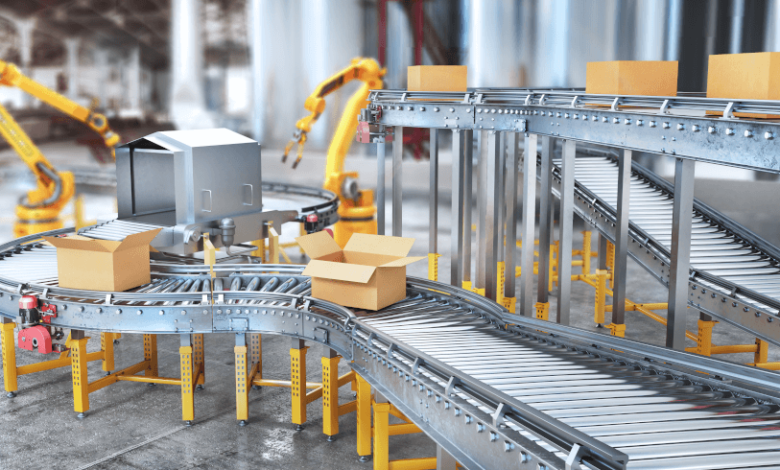Enhancing Material Handling With Reliable Solutions

Introduction
Efficient material handling is a cornerstone of modern manufacturing and logistics operations. A smooth and reliable conveyor system is essential for moving products, reducing manual labor, and increasing overall productivity. Conveyor rollers manufacturer play a vital role in providing high-quality components that ensure the performance and durability of these systems.
Understanding Conveyor Rollers
Conveyor rollers are cylindrical components that facilitate the movement of goods along conveyor systems. They reduce friction, provide support, and allow for smooth transfer of products between different sections of a production or distribution line. Selecting the right rollers is critical to ensure longevity, efficiency, and safety in material handling processes.
Key Features Of High-Quality Rollers
Several attributes distinguish premium conveyor rollers:
- Durability: Manufactured from robust materials such as steel, stainless steel, or reinforced polymers to withstand heavy loads.
- Smooth rotation: High-quality bearings ensure minimal friction and consistent motion.
- Corrosion resistance: Essential for operations in humid or chemical-rich environments.
- Load capacity: Designed to handle varying weights depending on the specific application.
- Customization options: Sizes, coatings, and designs can be tailored to meet operational requirements.
Advantages Of Using Superior Conveyor Components
Using high-quality components from a trusted conveyor rollers manufacturer offers multiple benefits:
- Operational efficiency: Reduces downtime caused by worn or faulty rollers.
- Cost savings: Durable components lower maintenance and replacement costs over time.
- Improved safety: Reliable rollers minimize the risk of accidents in production or warehouse environments.
- Enhanced workflow: Smooth and consistent material movement ensures faster throughput.
- Versatility: Suitable for different industries including manufacturing, warehousing, and packaging.
See also: The Intersection of Health and Technology: Advancements in Medical Tech
Applications Across Industries
Conveyor rollers are essential in numerous sectors:
- Manufacturing: Facilitate the movement of raw materials, semi-finished, and finished products across production lines.
- Warehousing and logistics: Support automated sorting and transportation systems for faster order fulfillment.
- Food and beverage industry: Ensure smooth and hygienic transfer of packaged products.
- Automotive sector: Handle heavy components and assemblies efficiently.
- Mining and material processing: Move bulk materials under harsh conditions, requiring durable and robust rollers.
Material Selection And Roller Types
Different types of rollers serve distinct purposes depending on operational demands:
- Steel rollers: Ideal for heavy-duty applications, offering strength and longevity.
- Stainless steel rollers: Suitable for food-grade or corrosive environments.
- Plastic or polymer rollers: Lightweight, corrosion-resistant, and suitable for light to medium loads.
- Rubber-coated rollers: Provide grip and cushioning for delicate products.
Material choice impacts durability, load-bearing capacity, and operational efficiency.
Customization And Manufacturing Precision
A reputable conveyor rollers manufacturer offers customization to meet unique operational needs:
- Size and diameter: Ensures compatibility with existing conveyor systems.
- Bearing types: Different options such as ball or roller bearings affect load capacity and smoothness.
- Surface finishes: Coatings for corrosion resistance, grip, or aesthetic purposes.
- Special designs: For curved, inclined, or modular conveyor setups.
Customization enhances system efficiency and reduces the need for frequent maintenance.
Maintenance And Longevity
Proper maintenance extends the life of conveyor rollers and ensures optimal performance:
- Regular inspections: Identify wear, misalignment, or damage before it affects operations.
- Lubrication: Reduces friction and prevents premature bearing failure.
- Cleaning: Prevents debris accumulation which can cause jams or uneven movement.
- Replacement schedule: Timely replacement of worn rollers avoids costly downtime.
Trends In Conveyor Technology
Modern conveyor systems are evolving with technological advancements:
- Automation integration: Rollers designed for automated systems with sensors and monitoring capabilities.
- Eco-friendly materials: Sustainable materials and coatings reduce environmental impact.
- Enhanced durability coatings: Extend the life of rollers in harsh conditions.
- Modular designs: Allow easy replacement and adaptability for changing production layouts.
Conclusion
Reliable conveyor rollers manufacturer for efficient material handling across industries. Partnering with a trusted conveyor rollers manufacturer ensures that systems operate smoothly, safely, and cost-effectively. By selecting durable, customized, and high-quality rollers, businesses can improve productivity, reduce downtime, and maintain a competitive edge in their operations.




